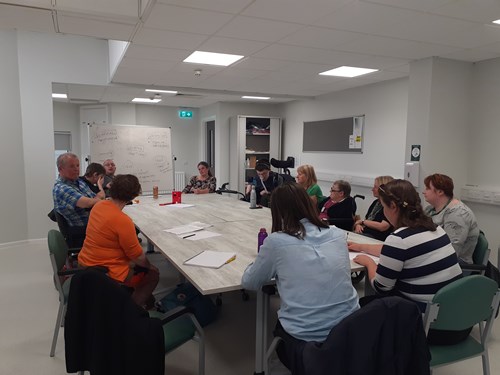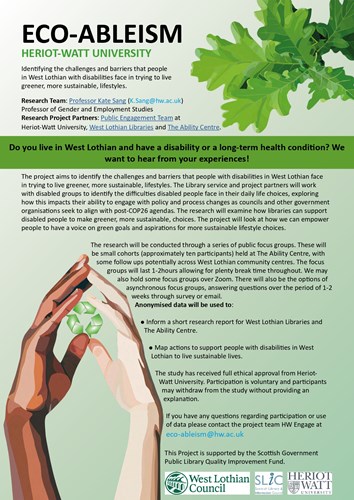3.3 Collaborate with partners to contribute towards the sustainable development agenda for 2030
 Eco-abelism was a partnership project with Herriot Watt University to research the challenges and barriers that people in West Lothian with disabilities face in trying to live greener, more sustainable, lifestyles.
Eco-abelism was a partnership project with Herriot Watt University to research the challenges and barriers that people in West Lothian with disabilities face in trying to live greener, more sustainable, lifestyles.
West Lothian Libraries and The Ability Centre in Carmondean, collaborated with Heriot Watt University to facilitate discussion groups with people with disabilities to:
- Identify the challenges and barriers that people with disabilities in West Lothian face in trying to adopt greener, more sustainable, lifestyles
- Empower people with disabilities to have a voice and enable them to communicate with decision-makers
- Examine how libraries can offer practical help
 The participants in the discussion groups faced many challenges with accessing services, not just with recycling and greener lifestyle choices. In light of this the library service’s role has became broader, working collaboratively with the council and other stakeholders to empower disabled people to tackle these inequalities, and work to support them to have a voice and enable change.
The participants in the discussion groups faced many challenges with accessing services, not just with recycling and greener lifestyle choices. In light of this the library service’s role has became broader, working collaboratively with the council and other stakeholders to empower disabled people to tackle these inequalities, and work to support them to have a voice and enable change.
The outcomes of the project have been:
Giving people a voice. People with disabilities often felt ‘invisible’ with a lack of services that suit their needs. Public transport is inaccessible, and staff are often unhelpful or aggressive and people with disabilities often report very negative experiences when outside the home, which leads to isolation. This was at its worse during Covid, with many clinically vulnerable people very reluctant to mix in the community and a common feeling that ‘everyone else has moved on’.
Challenges and barriers. There was generally a high level of support for taking action to address climate change and making environmentally friendly choices. However, the barriers to disabled people being able to do this were significant. These ranged from financial concerns – that heavily packaged items and ready meals are often cheaper, for example, to issues relating to their type of disability and care arrangements.
How libraries can help. Respondents felt that the library could be a provider of information. There was clearly a lack of awareness about services, with little known about additional information or support services for people with disabilities.



